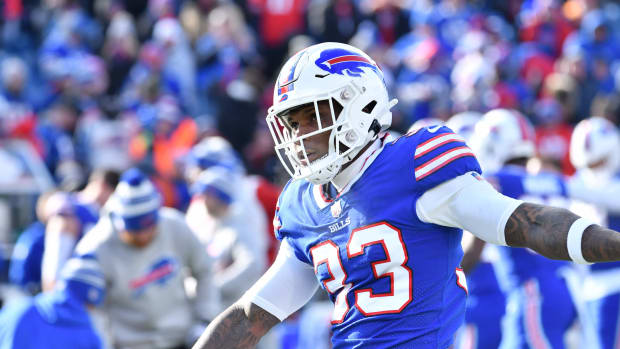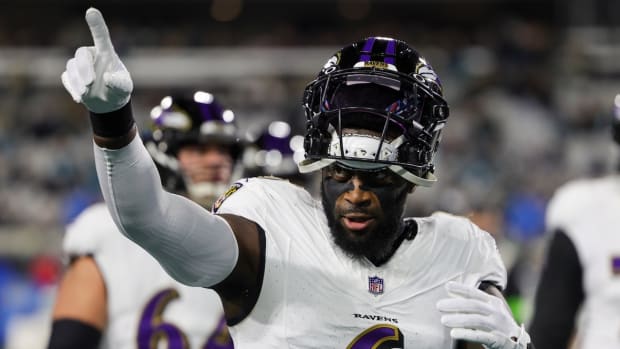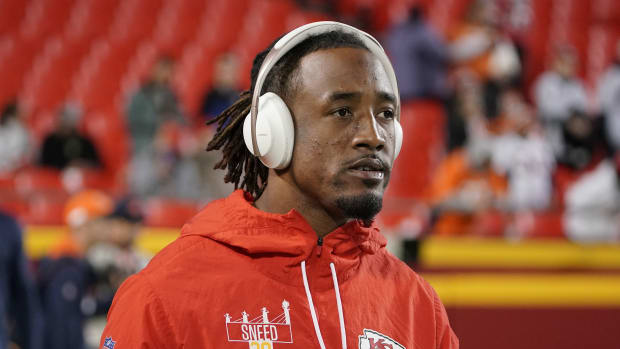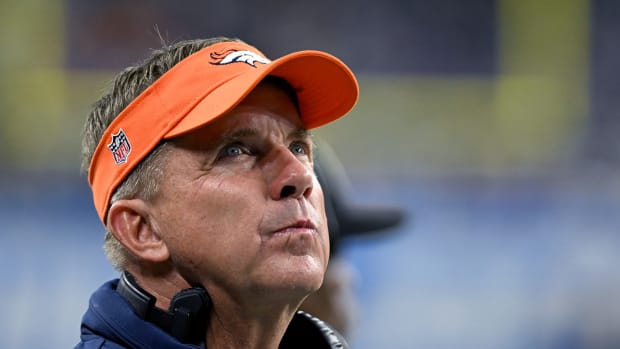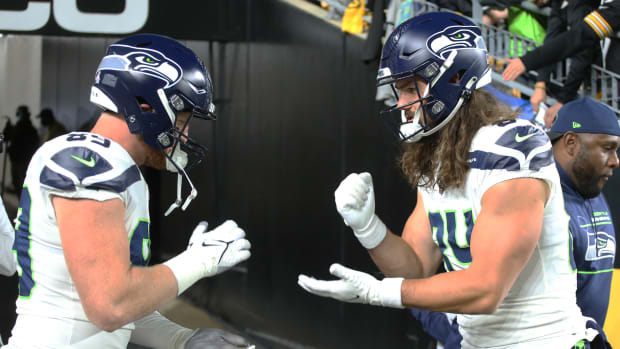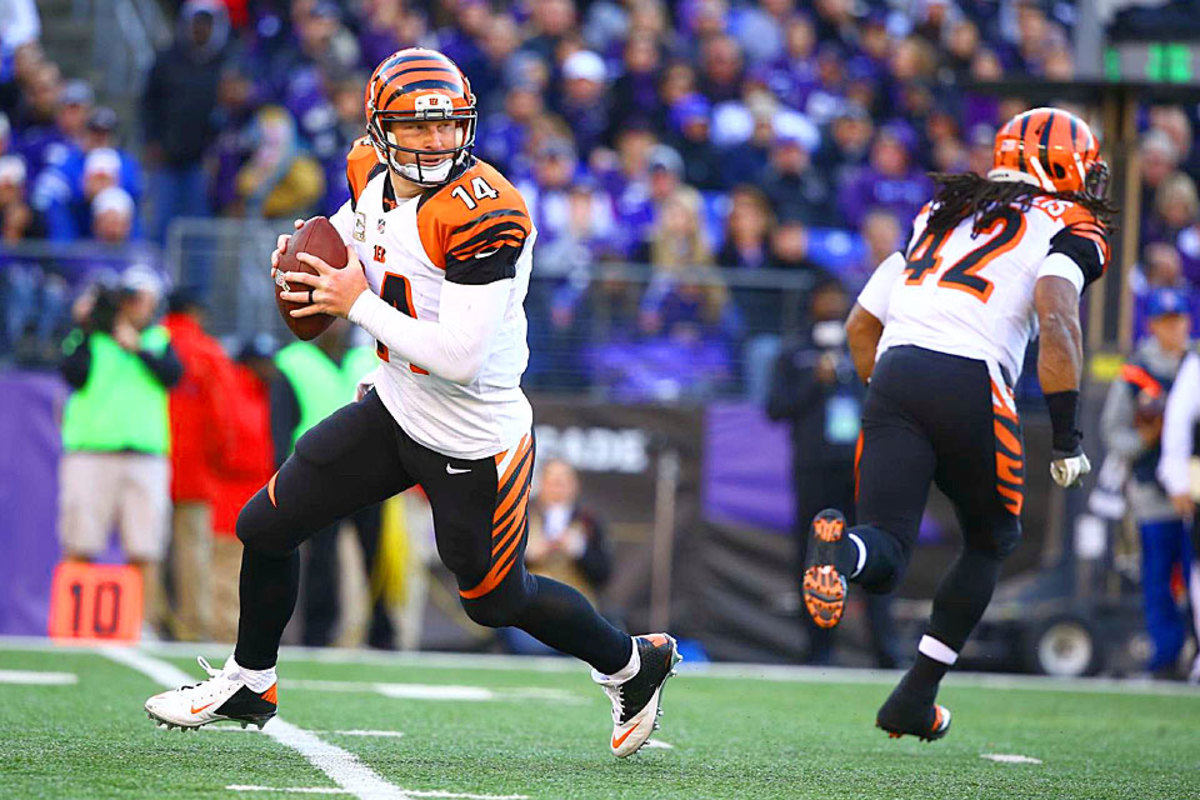
Bengals to World: ‘Andy’s Our Guy’
CINCINNATI — The outside world has lost faith in Andy Dalton the playoff quarterback, but that’s not the case inside the walls of the Bengals offices at Paul Brown Stadium. And Sunday afternoon, when the quarterback reached a six-year, $115-million deal with the team (“It’s done,” Dalton texted coach Marvin Lewis), the head coach had a sigh of relief instead of a feeling of dread that many Cincinnati fans who don’t trust Dalton had when the news broke today.
“We never wavered in our support for Andy,” coach Marvin Lewis said today. “I never wavered. [Owner] Mike Brown never wavered. Quarterback is Mike’s position, and he loves Andy. Andy’s our guy, and will be.”
I asked Lewis about how Dalton will be able to tune out the noise from fans and analysts who think he’s a pedestrian player who crumbles in the playoffs. “He’s got strong enough makeup to understand that’s part of it,” said Lewis. “His maturity and intelligence is such that he can handle that stuff.”
The contract is structured in a way that makes it a pay-as-you-go deal, similar to the nearly year-by-year contract his 2011 draft buddy Colin Kaepernick signed in San Francisco. Dalton is guaranteed $17 million; the contract’s base value, according to The NFL Network, is $96 million over six years, with incentives boosting it to a potential $115 million. The Bengals can walk away with minimal financial penalty after any year of the deal.
The signing is controversial, of course, because the quarterback’s career is A Tale of Two Daltons. He’s one of only three QBs ever to win at least 30 games in his first three seasons. But he’s crashed and burned in three straight Wild Card games: 31-10 at Houston in 2011, 19-13 at Houston in 2012, and 27-10 in a particularly disastrous three-interception home game against San Diego last January. Charting Dalton in the regular season versus postseason shows why so many Bengals fans were against paying him big money:
| W-L | Comp % | Yds/Game | TD-Int | Yds/Att | Rating |
Regular Season | 30-18 | .609 | 236.7 | 80-49 | 7.0 | 85.7 |
Playoffs | 0-3 | .569 | 239.3 | 1-6 | 5.8 | 56.2 |
Dalton told me after his news conference today that he knows he has to play better in the playoffs. “But I knew the contract would get done, because everyone here wanted it to get done—Marvin, Mr. Brown, me, everyone in the organization. I appreciate the confidence they’ve shown in me.”
That confidence surprises those outside the organization. And I was surprised by something Lewis said to me today: “From the day we worked him out at TCU [in spring 2011], he has never disappointed me.” I am sorry. I can’t believe Lewis wasn’t disappointed by Dalton’s play in the second half against San Diego.
“He’s played well, and then we’ve lost in the playoffs,” Lewis said. “The important thing, we all lost in the playoffs. Last season, we fumbled to cost us early, then the quarterback fumbled, and then quarterback threw an interception, and in the second half, the defense couldn’t stop [San Diego] on third down. I think it’s on us, all of us, and not just the quarterback.”
Said receiver A.J. Green: “He gets too much crap for … us not winning the playoff games, but we all put a hand in that.”
That has been the coach’s constant theme, and several players repeated it here. So Lewis’s mantra around the team is working. But Dalton deserves more than just a little blame for the playoff losses. His reaction to pressure, particularly in the second half against San Diego, was terrible. If he and new offensive coordinator Hue Jackson can’t fix that, Dalton’s contract won’t look so good, no matter how many regular-season games he wins.
Last point: The Bengals didn’t want the Dalton deal to hang over their season. They didn’t want to risk him being franchised at the end of the year if he had a good year and his contract was up and the team decided to keep him; by then the price would be higher. But on the flip side, if the Bengals have a poor year and Dalton struggles, his market in free-agency could be weak, and the Bengals could have gotten a bargain. It was clear entering a walk year in 2014 (or at least the NFL’s version of a walk year, in which players are tethered to a team with the franchise tag) that the Bengals didn’t want to risk Dalton not being under contract for the long term. With all quarterbacks in the competent-and-above area getting $17 million to $23 million a year, Dalton’s deal is outlandish, yet understandable.


































